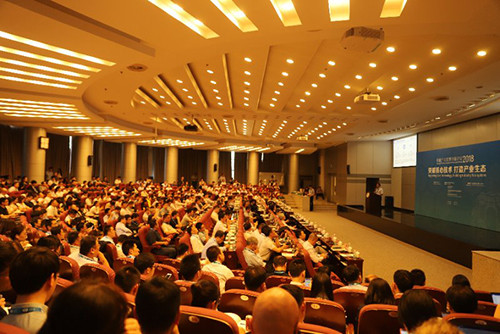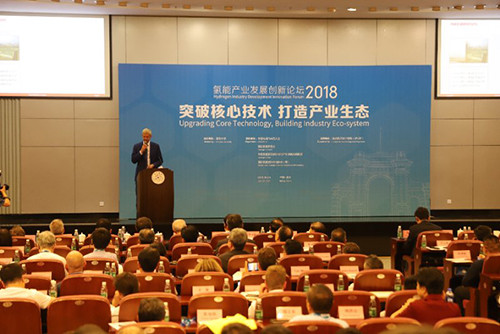

With Bright Future of FCEV and Hydrogen Industry, GWM Leads the Hydrogen Technology R&D
On June 28, 2018, Hydrogen Industry Development and Innovation Forum was hosted by Tsinghua University and undertaken by the Hydrogen Council and other organizations in Beijing. Centering on the topic “breaking through core technology, building industry ecosystem”, this forum gathers people to exchange views and discuss the development of the hydrogen energy in the transportation.
On June 28, 2018, Hydrogen Industry Development and Innovation Forum was hosted by Tsinghua University and undertaken by the Hydrogen Council and other organizations in Beijing. Centering on the topic “breaking through core technology, building industry ecosystem”, this forum gathers people to exchange views and discuss the development of the hydrogen energy in the transportation.
The forum has attracted numerous experts from colleges and universities, research institutes, investment institutions and energy and vehicle enterprises to discuss the big plan for the new energy. Wei Jianjun, the chairman of GWM, attended the event while Tobias Bruner, the vice president of GWM, delivered a speech.

In 2006, GWM stepped into the field of new energy research; in March, 2018, the Hydrogen Council announced the list of its new members and GWM is the first Chinese automaker to be a member of the Council. At the same time, the council also includes Audi, BMW, Daimler, GM, Honda, Hyundai, Toyota and other famous multinational motor companies.
FCEV’s Bright Future with the Hydrogen Technology as the Competition Focus
From the technological perspective, new-energy vehicles can be divided into three types: the plug-in hybrid electric vehicle (PHEV), the battery electric vehicle (BEV) and the fuel cell electric vehicle (FCEV). PHEV integrates the advantages of the traditional petrol-powered car, such as long driving mileage and short fueling time. However, PHEV is not really with zero-emission. It is more like a transition on path to the battery electric mode. At present, BEV has reached a certain scale in China, with millions of battery electric passenger cars, buses and other vehicles on the road. In future, BEV is more likely to be equipped with the high-precision self-driving function, which is quite useful for the short-distance urban commuting. FCEV is comparable with PHEV in terms of long driving mileage and easy fuel injection with absolute zero emission as its edge. FCEV is the best choice for buses, trucks and those large passenger cars which require long driving mileage. GWM believes that FCEV will become an important passenger car type in 2025.
China’s First One Again! GWM Hydrogen Technology Center Has Been Put into Use
Up to now, the hydrogen energy is still a tricky problem both at home and abroad for its transportation, storage and injection. The liquid hydrogen boils at -253 C, which means that it is not an easy job to make the liquid hydrogen. GWM researchers say that the cryogenic compression technology could be used to pressurize hydrogen to 5 MPa, 50 MPa or 70 Mpa, and cryogenic gases (cryogenic compressed gas) can be directly added without precooling. With such liquid hydrogen, we estimate that the cost for hydrogen terminal injection could be as low as between 30 and 40 yuan per kilogram. With considerable driving mileage and low cost, hydrogen can compete with gasoline.

In 2018, China’s first hydrogen technology center has been established by GWM and been put into use. It has the capacities for the testing and trial-manufacturing of all FCEV core components and the vehicle integration and testing. In 2025, GWM will set up China’s first liquid hydrogen station equipped with the cryogenic compression technology, completing a series of R & D activities, such as assembling, hydrogenation and testing of FCEV, in the same area of GWM.
GWM plans to display its first FCEV prototype vehicle based on the proprietary design platform in 2020 and push out its first FCEV fleet in the Winter Olympics. Based on its strong technical reserves, GWM also plans to push out the fuel passenger vehicle of high power, cost competitiveness and high energy efficiency in 2025.
Leading the Trend-Setting Technologies Development and Bravely Shouldering Social Responsibilities of Environmental ProtectionGWM firmly believes that the hydrogen energy will play a crucial role in the fields of energy and transportation in China and even the whole world. Hydrogen, as a clean renewable fuel, will help mankind to use the intermittent energy resource as the renewable one, thus realizing the real zero-emission transportation. Confronted with such important tasks as improving air pollution and reducing greenhouse gas emissions, China is expected to grow up as a leader in the worldwide renewable energy society. By joining the Hydrogen Council, GWM will shoulder its corresponding responsibilities so as to make its contribution to building a global hydrogen society.